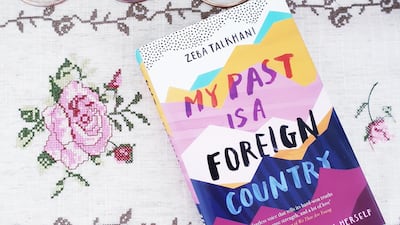"Patriarchy expects us to play our roles, and these roles are scripted," states Zeba Talkhani in her breakout book titled My Past is a Foreign Country. Talkhani was raised in Jeddah, before living in India, Germany and England, and though she deplores the patriarchal norms that inform her culture and family life, her autobiography conveys the matter-of-fact message that, as a South Asian, Muslim woman, you can never fully escape those conventions.
Talkhani, who identifies as an intersectional feminist, studied journalism, and contributed a chapter to the Nasty Women anthology, which was published in 2017. In My Past is a Foreign Country, she candidly chronicles the experiences that shaped her into the woman she is today.
The author never feels truly happy or accepted within the confines of her restrictive family, who treat her like a spinster at the age of 23. She is constantly reminded about "the eventuality of education-marriage-children as a life plan". While her friends graduated high school and mostly married aged 21, often to controlling husbands who force them to delete Facebook and WhatsApp, Talkhani has other plans. She wanted to continue studying and establish a career for herself. Her mother, however, views pursuing a career as Talkhani's way of running from her future, not securing it. But the author, fed up with the double standards on gender that form societal norms, which she writes have been "recycling trauma" for generations, paves her controversial path with perseverance.
In the book, we read about her complicated relationship with her mother, or "Mama". But while Mama may be portrayed as the story's antagonist, she is also a constant motivator for Talkhani, who wants nothing to do with the traditional lifestyle her mother leads as a housewife.
"Mama spent her twenties and thirties cooking for people she did not know," Talkhani writes while describing a night her mother slaved away on more than 10 elaborate dishes for her father's colleagues, even injuring herself in the process, but playing the part of host come dinnertime.
Mama, she describes through one schoolmate’s quote, looks “regal”, but conventional beauty is a topic that’s touchy for Talkhani, who suffered from a hair loss condition from an early age, an ailment she is candid about throughout her book. Her hair is the cause of much insecurity, and Mama constantly and insensitively links her daughter’s lack of thick, luscious locks, with her lack of marriageability. “With every passing year, I was losing more hair and, with it, my chance at a conventional future within my community,” writes Talkhani.
She opts for bandanas, not hijabs, to conceal her thinning hair, as she doesn’t want to don traditional headscarves without the religious intent to do so. Yet, still, her faith is a strong grounding point for Talkhani, who says she often prays for people even when they treat her poorly.
The most engaging passages of Talkhani’s story are when she openly questions established cultural customs and, forming her own conclusions about what her religion ultimately asks of her, eschewing orthodox interpretations in favour of feminist readings of the sacred texts.
At a time when diversity is in the spotlight in the realms of fashion, entertainment, art and literature, Talkhani’s autobiography provides a unique voice on hot-topic issues of feminism, Islam, immigration and patriarchy.
South Asian female activists in the West are often vocal, and at times aggressive. Talkhani's approach is quieter, yet effective. But, My Past Is a Foreign Country is far from a mopey memoir. She doesn't decry the hand that life has dealt her, instead choosing to remain within the system but on her own terms. That might disappoint some readers, but it's a mature, realistic and practical approach. Talkhani might liken the patriarchy to a mental prison, but when women imagine the walls crumbling down, she writes, they'll be set free.
While her experience is by no means representative of each and every Eastern woman’s upbringing, many readers will find common ground with the author’s various trials, both in India and abroad. After all, her challenges don’t end in the West, as, when she moves to the UK, she encounters “snobbery” and “subtle racism”, both judgements of which are simply obstacles for her to overcome when fitting in with her peers.
Her memoir may not be particularly groundbreaking or overtly controversial in the eyes of many, but Talkhani's feat shouldn't be taken lightly. At one point in the book she writes, "I did not want to spend the rest of my life listening to the stories of men in my family. I wanted to write my own." Through this book, bound by a cover decorated with jagged lines in vivid colours, which emblemise the layers of anecdotes its pages hold, that's exactly what she has accomplished, at the age of 28.


